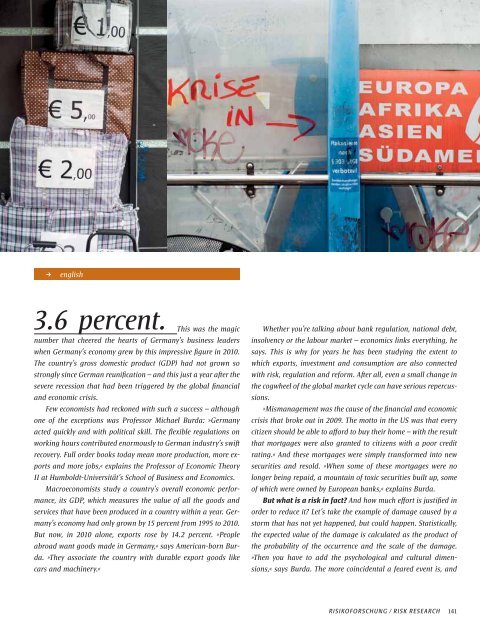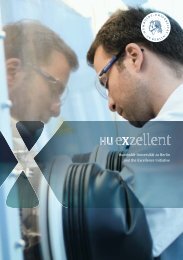hu wissen (pdf) - Exzellenzinitiative - Humboldt-Universität zu Berlin
hu wissen (pdf) - Exzellenzinitiative - Humboldt-Universität zu Berlin
hu wissen (pdf) - Exzellenzinitiative - Humboldt-Universität zu Berlin
Sie wollen auch ein ePaper? Erhöhen Sie die Reichweite Ihrer Titel.
YUMPU macht aus Druck-PDFs automatisch weboptimierte ePaper, die Google liebt.
k english<br />
3.6 percent. This was the magic<br />
number that cheered the hearts of Germany’s business leaders<br />
when Germany’s economy grew by this impressive fi gure in 2010.<br />
The country’s gross domestic product (GDP) had not grown so<br />
strongly since German reunifi cation – and this just a year a� er the<br />
severe recession that had been triggered by the global fi nancial<br />
and economic crisis.<br />
Few economists had reckoned with such a success – although<br />
one of the exceptions was Professor Michael Burda: »Germany<br />
acted quickly and with political skill. The fl exible regulations on<br />
working hours contributed enormously to German industry’s swi�<br />
recovery. Full order books today mean more production, more exports<br />
and more jobs,« explains the Professor of Economic Theory<br />
II at <strong>Humboldt</strong>-<strong>Universität</strong>’s School of Business and Economics.<br />
Macroeconomists study a country’s overall economic performance,<br />
its GDP, which measures the value of all the goods and<br />
services that have been produced in a country within a year. Germany’s<br />
economy had only grown by 15 percent from 1995 to 2010.<br />
But now, in 2010 alone, exports rose by 14.2 percent. »People<br />
abroad want goods made in Germany,« says American-born Burda.<br />
»They associate the country with durable export goods like<br />
cars and machinery.«<br />
Whether you’re talking about bank regulation, national debt,<br />
insolvency or the labour market – economics links everything, he<br />
says. This is why for years he has been studying the extent to<br />
which exports, investment and consumption are also connected<br />
with risk, regulation and reform. A� er all, even a small change in<br />
the cogwheel of the global market cycle can have serious repercussions.<br />
»Mismanagement was the cause of the fi nancial and economic<br />
crisis that broke out in 2009. The motto in the US was that every<br />
citizen should be able to aff ord to buy their home – with the result<br />
that mortgages were also granted to citizens with a poor credit<br />
rating.« And these mortgages were simply transformed into new<br />
securities and resold. »When some of these mortgages were no<br />
longer being repaid, a mountain of toxic securities built up, some<br />
of which were owned by European banks,« explains Burda.<br />
But what is a risk in fact? And how much eff ort is justifi ed in<br />
order to reduce it? Let’s take the example of damage caused by a<br />
storm that has not yet happened, but could happen. Statistically,<br />
the expected value of the damage is calculated as the product of<br />
the probability of the occurrence and the scale of the damage.<br />
»Then you have to add the psychological and cultural dimensions,«<br />
says Burda. The more coincidental a feared event is, and<br />
RISIKOFORSCHUNG / RISK RESEARCH<br />
141



